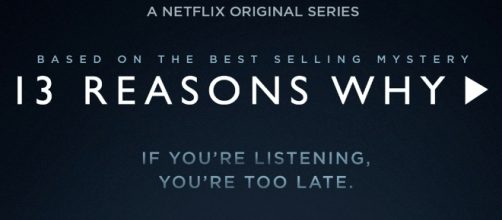Trigger warning: this post refers to and discusses suicide, self-harm, rape, abuse and physical violence.
Whether we like it or not, suicide happens. People kill themselves every day, yet suicide in TV is something that only really gets talked about half-heartedly and is barely ever actually depicted on screen. This is why Netflix’s adaptation of Jay Asher’s 2007 novel ‘13 Reasons Why’ is so important, especially for today’s generation of teenagers.
Hannah's story
"13 Reasons" Why tells the story of Hannah Baker, a high school sophomore who committed suicide.
Before she killed herself, she recorded thirteen tapes, telling her story of why she killed herself. Each tape addresses a different person, and the tapes have been passed from one of them to the next until they arrive on the doorstep of Clay Jensen, her former classmate, and colleague. Each episode shows Clay listening to the tapes, learning all of the horrific things that happened to Hannah in the months leading up to her death.
He learns that she was betrayed, victimized, stalked, harassed, and raped. These discoveries send him on a rollercoaster of emotion, from resentment to hopelessness. The show is so honest, so much so that it’s incredibly difficult to stomach at points. The final episode shows Hannah slitting her wrists in the bath.
No fancy camera angles to avoid actually showing it, just pure and unpolluted realness. When you watch somebody do that, even if they are fictional, you feel their pain. Their pain is your pain, and everything that they’ve been through feels real. The show also features two harrowing rape scenes. This much integrity is incredibly rare for what is essentially a teen drama.
The Hannah Baker that we all know
Everybody who watches the show shares Hannah’s pain. Everybody gets to feel what she felt, what hundreds of teenagers feel day in and day out. This is why it’s so important that suicide is depicted so honestly on TV. The same things that happened to Hannah are happening to teenagers every day, in a world that’s so invested and so heavily influenced by what we see on television.
"13 Reasons Why" is a brutally honest depiction of high school, of the high school experience that resonates with far too many people. It forces the viewer to look at their own behavior, to think about the way they treat people. It forces us to think about how people we walk past every day may be feeling the same ways as the show's characters.
Everything that’s portrayed is realistic enough to be painful to watch, but not so real that it’s impossible. It’s difficult, and it’s hard to swallow because Hannah Baker is no different from the people who walk the halls of high schools every single day. Hannah Baker may be no different from your daughter or your son or your best friend, only Hannah Baker is dead.
Hannah went to hell and back. Ultimately, she made the decision to kill herself, but the show proves just how easily influenced teens are by their peers' behavior, and holds each character responsible for their role in Hannah’s demise. Bryce, the token asshole jock, and subject of the twelfth tape, is forced to confess to raping Hannah. Alex, who the third tape is dedicated to, feels so deeply about what he did that he shoots himself in the head.
Hannah is no different from anyone else, but neither is Bryce, or Alex, or Clay, or any of the other characters who have a tape dedicated to them. We see Hannah's every day in our own lives, but we also see Bryce and Alex and Clay. We see people who are hurting and people who hurt other people, and 13 Reasons Why shocks us into thinking about this, in a way nobody ever really wants to.
It reminds us that we are all responsible for the ways we affect other people’s lives. It reminds us that we have to look after each other. We have to work to end the shocking rate at which people around us are becoming just like Hannah Baker.
You can watch the full first season of "13 Reasons Why" on Netflix from the 31st of March 2017.

